All Aboard the NC State Mobile Veterinary Hospital
A day spent spaying and neutering feral cats at the Chatham County Sheriff's Animal Rescue Center helps a community and provides veterinary students a nonstop whir of learning, doing and cooing.
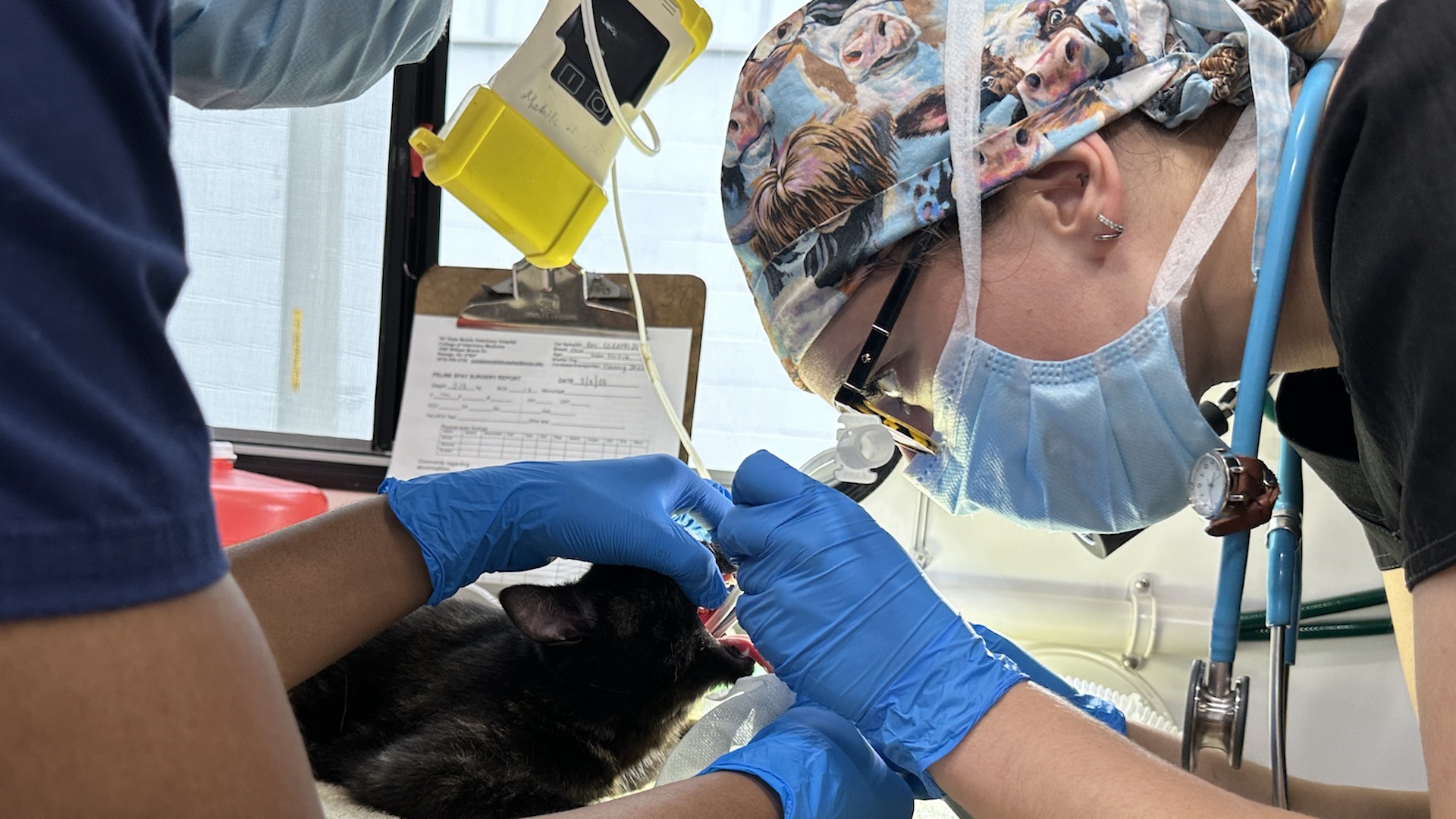
By Burgetta Eplin Wheeler
Out front of the Chatham County Sheriff’s Animal Resource Center, SUVs and pickup trucks sit idling, their human and feline occupants waiting before 8 a.m. for the NC State Mobile Veterinary Hospital to open up the day’s assembly line of astonishing cat-care efficiency.
Under the instruction of Dr. Kelli Ferris, seven fourth-year NC State College of Veterinary Medicine students will spend the next nine hours setting up the hospital space, spaying and neutering the feral cats that the kind-hearted Chatham residents trapped overnight and cleaning up before heading back to campus. On the last day of a two-week clinical block, the students also will administer deworming and anti-flea medications, vaccinations and microchips inside the mobile unit parked out back of the center in Pittsboro.
First, however, the cats in their towel- and sheet-covered traps must be logged in by date and number and separated by gender if possible. Females require more time for surgery, medications and recovery, and Ferris finds she will plan the day based on 12 females and six males. These 18 cats will offer the students a chance to hone their surgical skills and to help a community in need as well.
“We use this as an opportunity to learn a lot of skills, surgery skills, ergonomics, yes, but human skills, organizational skills, problem-solving skills,” says Ferris, a clinical assistant professor of animal welfare who has been directing the mobile hospital since it went operational more than two decades ago. “We tailor surgery and anesthetics to each patient.
The cats have been humanely trapped with food laced with calming medicine to reduce their stress as much as possible, Ferris says. Chatham Animal Rescue and Education, a local organization with a mission to promote the health and safety of all cats and dogs in Chatham County, supplied the food and traps to residents who responded to an email announcement about the NC State spay and neuter day.
Shannon Frazier of Bear Creek has brought two of the eight cats that roam her neighborhood.
“I’ve already gotten two so these are the next two,” says Frazier, who excitedly notes that she trapped the lone male of the eight on her first go-round. “I’m just trying to help out. To stop the suffering. It’s wonderful that people put forth effort to help out communities. NC State is a blessing.”
Keep the cats coming
Once the animals are inside the Chatham center, students work quickly to verify each cat’s gender while others head to the mobile unit to start preparing for what will become a nonstop but well-orchestrated blur of weighing cats, calculating dosages, sedating, examining, shaving, intubating and preparing medicines in the hospital’s staging area and disinfecting, cutting, suturing, vaccinating and microchipping in the operating room.
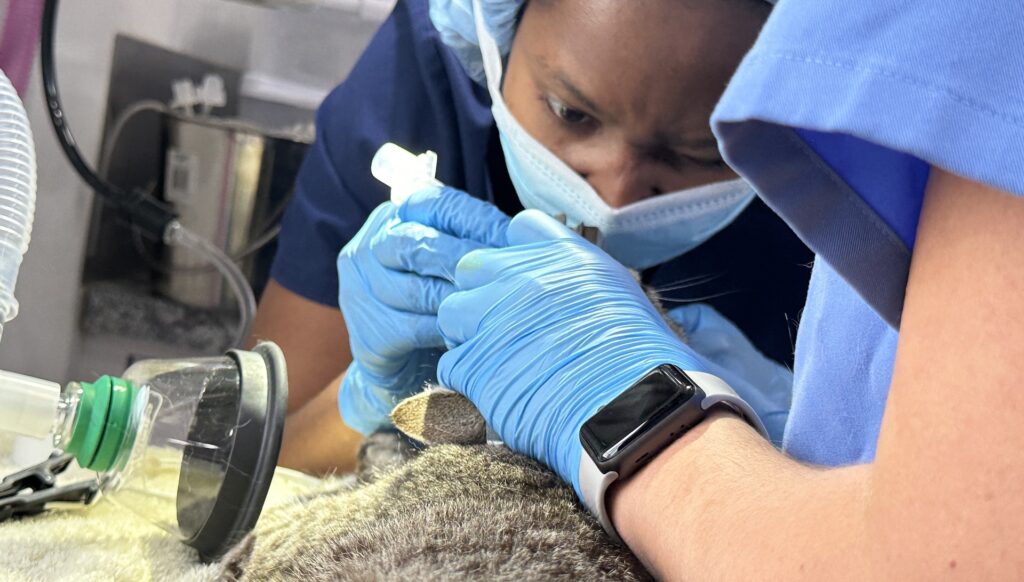
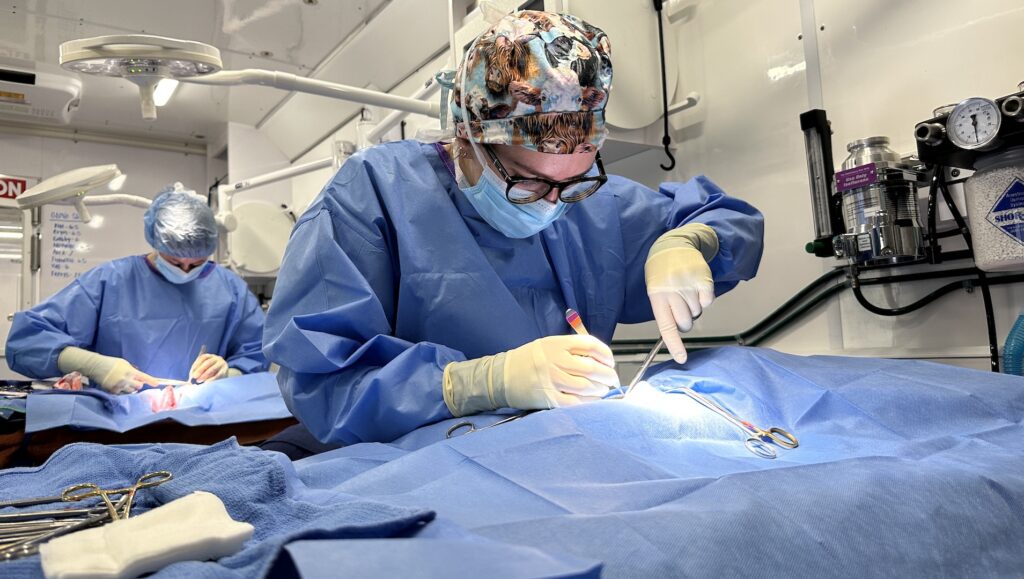
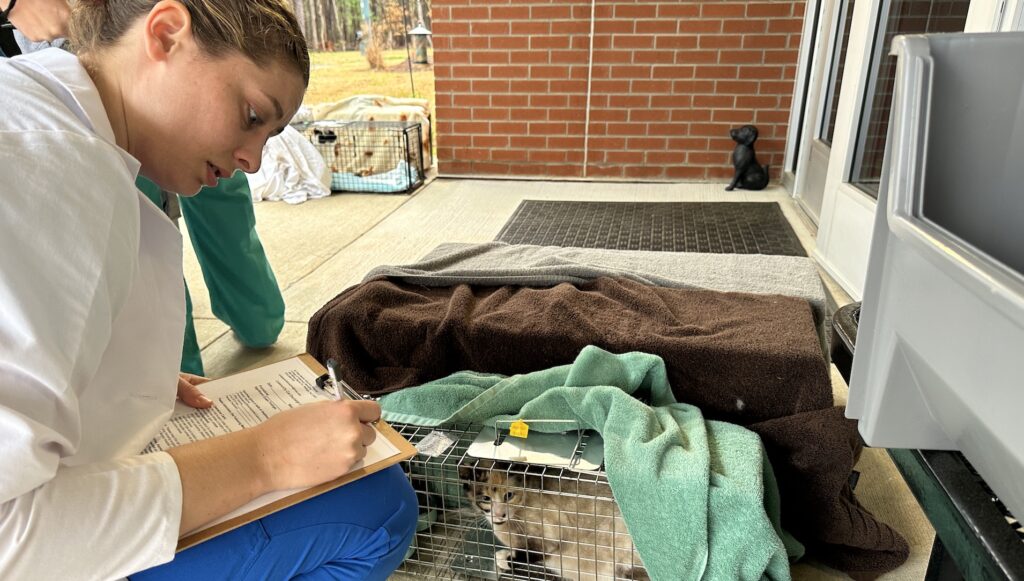
One goal, fourth-year student Francess Blake says, is never to let one of the hospital’s three operating tables stay empty for long.
This NC State Mobile Veterinary Hospital has been on the road since May 2022, when it replaced the one put into service in 2000.
In the staging area, the work must be managed around large metal cages going in and out of the 240-square-foot hospital, its interior walls constructed of white boards that hold all sorts of handwritten information: pain medicine formulas based on weight, student glove sizes, the day’s surgery schedule.
Every hour or so, someone dumps a load of dirty surgical towels into a tub outside the door, and the center’s workers launder them at the end of the day.
The activity is constant, but so is the chatter, which includes sweet reassuring coos to feral kitties and calm requests for help from colleagues.
“Hi, cutie. Do you know you sleep with your mouth open?”
“Oh, my gosh. You are adorable.”
“Are you available to get more cats?”
“We need to warm up blankets for this little baby.”
“Let me check your teeth, little guy.”
John Ladner, a licensed veterinary surgical technician, also has a commercial driver’s license so he can transport the 26,000-pound mobile hospital behind a truck to its community destinations.
With an uncanny sense of knowing where he’s needed most, Ladner spends the day rotating between the operating room and the staging area, cleaning surgical instruments and helping students with their tasks.
Lunch arrives inside the Chatham center, and the NC State team heads out one by one throughout the next few hours as time allows.
Teaching at the tables
Inside the operating room, Ferris moves from table to table, offering encouragement, checking sutures, answering questions and even putting her hands on student hands to better illustrate her words, which can be gentle and joking but also unmistakably authoritative and instructive.
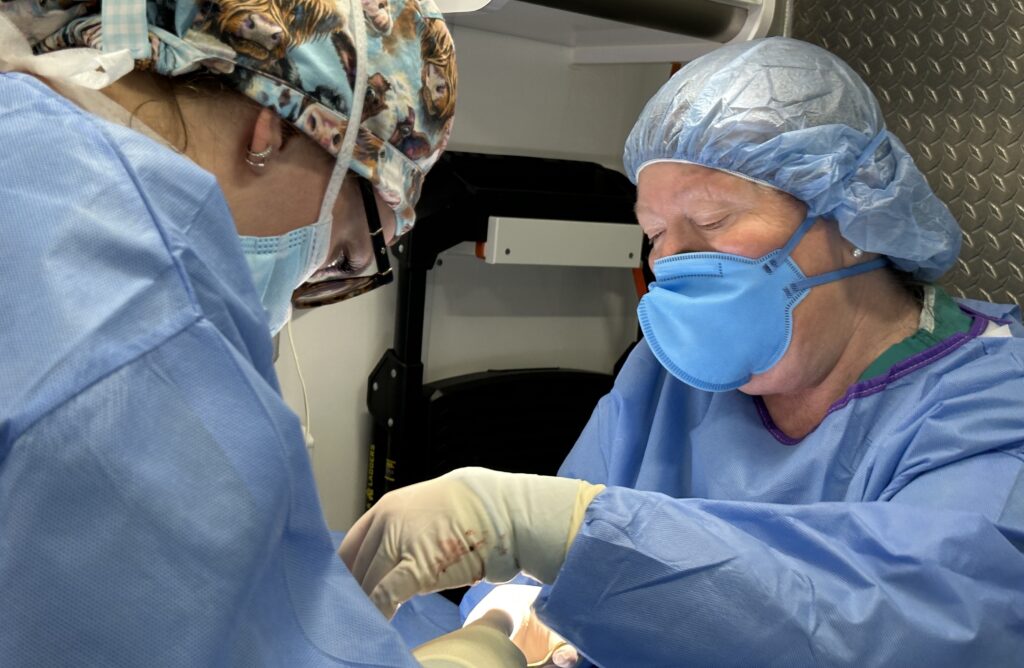
She reminds the student surgeons how to properly drape the animals, where to best place their instruments, how the overhead lights could be aimed better.
“You haven’t left yourself a lot of room,” she says at one point. “Here’s what I do when that happens.”
To another student, Ferris asks: “Should you lower your table? When I was in school, no one talked about ergonomics.”
Fourth-year student Eryn Ryan is suturing a particularly difficult patient, and Ferris tells her she’s doing a great job. Ryan explains that earlier in the week she struggled with putting the needle into the right layer of skin and that today is a victory she will celebrate.
Blake, who has a small-animal internship lined up after graduation in May, has spent her first few hours in the staging area, completed a spay surgery and is back in staging. The students take turns at the surgery tables, making sure everyone has equal opportunities to practice.
“It’s a lot of repetitiveness, which is good,” says Blake, who hopes eventually to work in academia. “We’re working with the drugs, so we’re getting our calculations down. It’s a lot of math and good practice for what we’re going to be doing in the future, like creating our anesthetic plans. I like the practice, especially the surgery, since a lot of us will be doing this on a daily basis.”
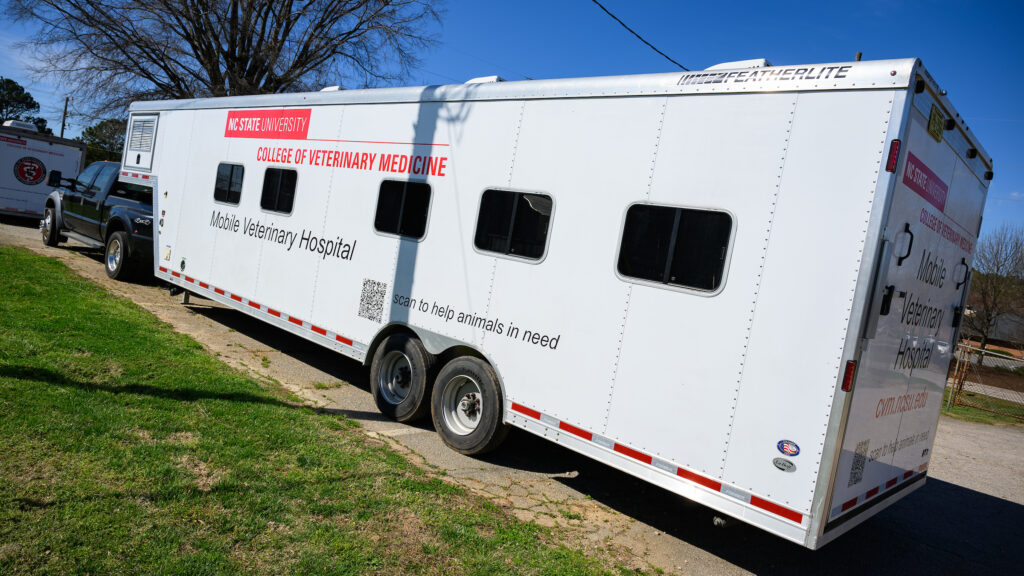
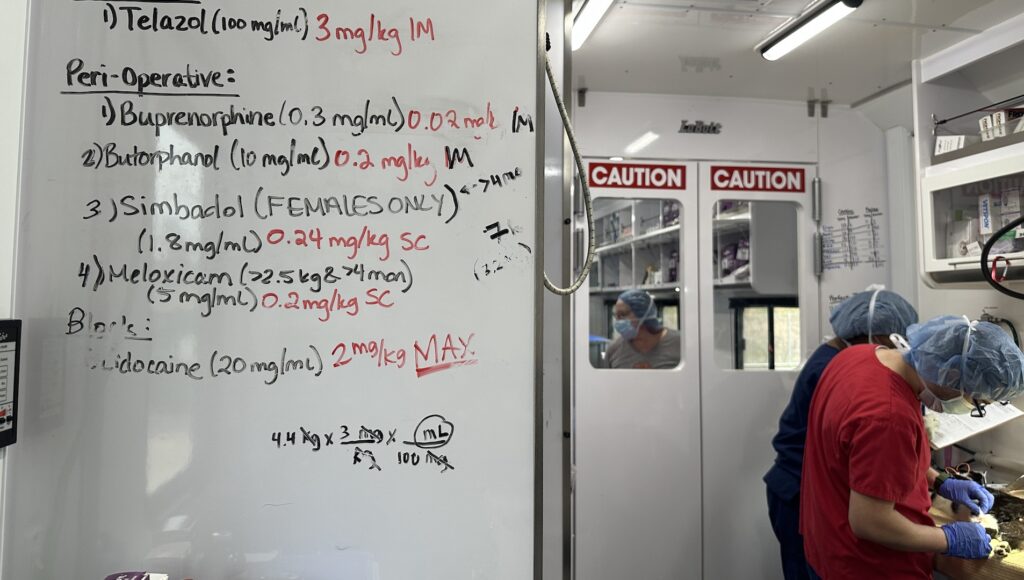
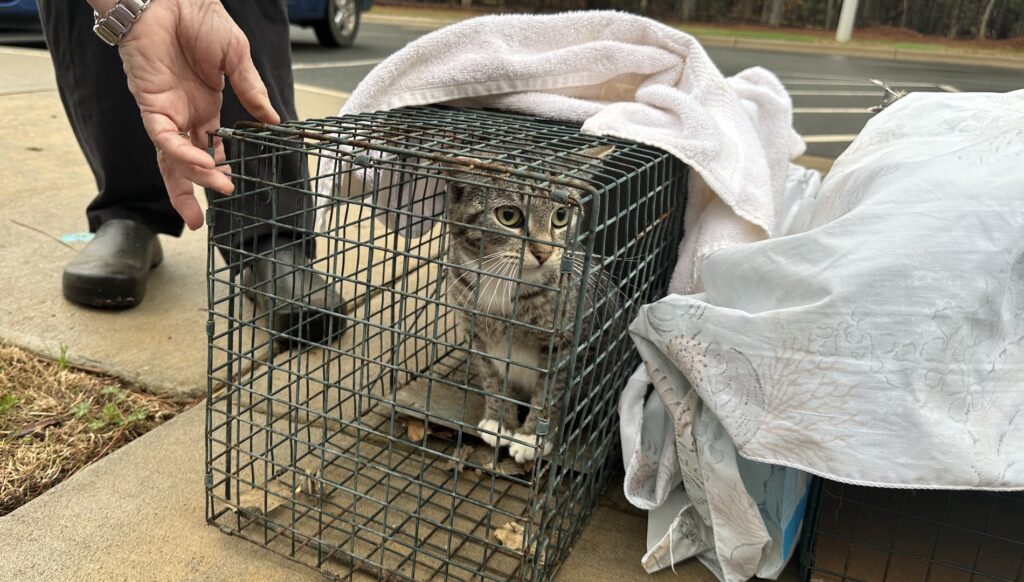
At nearly 2 p.m., Ryan asks whether anyone needs anything before she finally takes a break to eat. Someone asks her to bring in the next cat for its pre-surgery routine. When she finally steps out for lunch, it’s after 3 p.m.
By 5:30 p.m., the Chatham County cat trappers will return to pick up the animals that are now sterile, dewormed, vaccinated, microchipped and cared for.
“This is a game-changer for us because the local veterinarians are very backed up,” says Joan Cunningham, president of Chatham Animal Rescue & Education. “We have a very hard time getting our feral cats done so this is an absolute game-changer. We have almost 20 cats today, which would have taken almost six months to get to, and who knows how many kittens would have been born in the interim?”
The residents will monitor most of the recovering animals inside the traps overnight and, if all is well, let them go in the morning.
But now they won’t be fruitful and multiply.
Want to help support the mobile hospital? Visit https://go.ncsu.edu/mobilehospitalgifts
- Categories:


